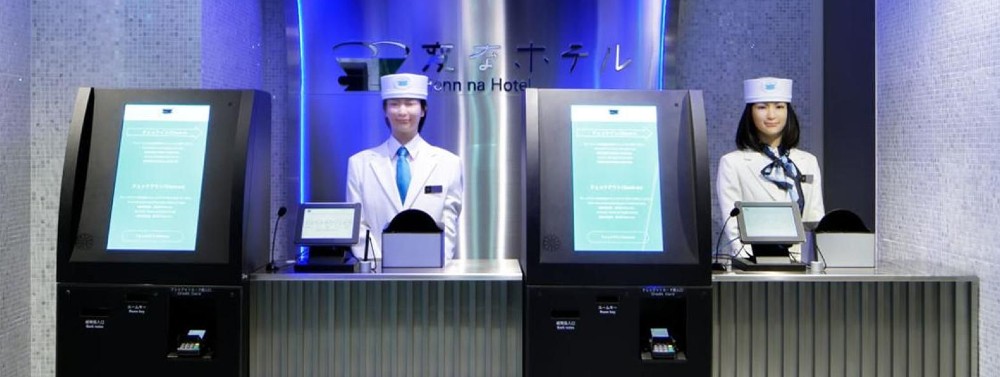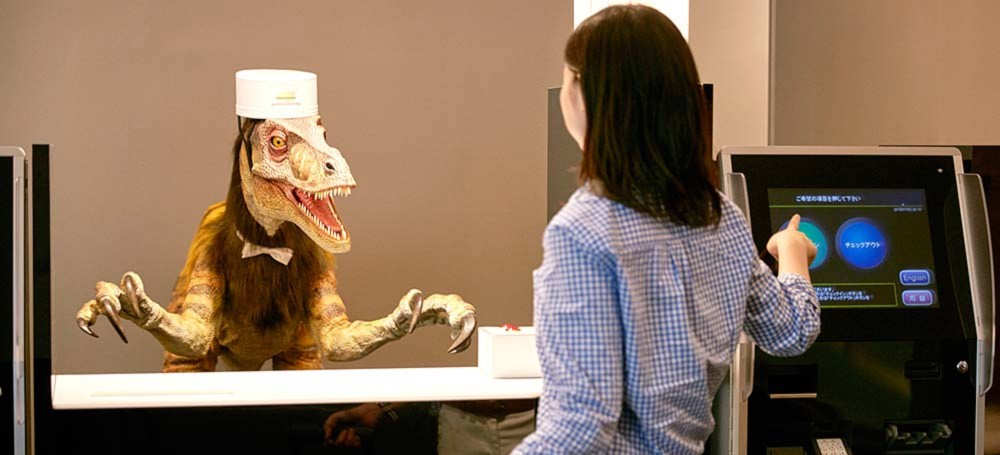What are the Coolest and Most Unique Hotels and Attractions in Japan?
May 2021
In 2019, Traveller reported that Japan had established itself as the world's fastest-growing tourism destination, with annual visits rising by more than 23 million. There are numerous reasons why increasing numbers of people opt to visit the East Asian country, including the region's stunning architecture and unique culture. Nowadays, Japan's distinctive attractions and quirky hotels are piquing traveler interests, which is unsurprising.
So, let's look at a couple of the coolest establishments that the country has to offer.

Robot staff await your arrival at Henn na Hotel in Hamamatsucho.
Henn na Hotel
Based in Nagasaki, the Henn na Hotel is one of the world's most unique hotel chains. The name translates as "strange hotel" and the quirky establishments have captivated domestic and international tourists because of their forward-thinking approach to customer service; when the original hotel came to fruition in Nagasaki six years ago, it became the first accommodation-focused facility to utilize robot staff. More than 20 more hotels have since been opened in Tokyo, Kyoto, Osaka and elsewhere in Japan, with franchises announced in Seoul and New York in 2021. The Henn na Hotel went into the Guinness World Record books in 2015, and it remains one of the most intriguing places to stay in Japan. According to The Guardian, the hotel's owner, Hideo Sawada, dreams of having robots account for 90 percent of the establishment's total workforce.
Upon arrival, visitors are greeted by robot dinosaurs, which are programmed to detect them through motion sensors. As per Phys.org, travelers check-in using a tablet, with the establishment seeking to minimize customer-facing administrative roles. However, it isn't only on arrival that tourists encounter Henn na Hotel's technology-powered workforce. Every room features a small robot that provides weather updates, changes the television channel, and much more.

Some Henn na Hotel staff make no attempt whatsoever to appear human.
Moreover, the robots aren't only there to assist. According to Grape, the quirky Henn na Hotel also features robotic fish which are merely there to be beautiful and add ambience. The mechanical creatures are battery-operated and embody the six-year-old business' forward-thinking approach to revolutionizing the leisire and entertainment industry.
Traditional Pachinko Parlors
Moving on from robot-powered hotels, but following the theme of leisure and entertainment, anyone on a rip to Japan should also seek to visit the country's traditional Pachinko parlors. With a pinball-like format, the traditional activity is played vertically and embraces an arcade aesthetic which has grown to play a significant role in the region's economy. Because of Japan's love for retro concepts, Pachinko machines incorporate different themes and stories, giving the much-loved market some variation.
Within the 21st century, the game has undergone a modern transformation. Nowadays, Pachinko parlors are very lively establishments, and they're scattered throughout Japan. According to the BBC, the Tokyo district of Shinjuku — where Sofia Coppola's Lost in Translation was filmed — is home to Espace, one of the country's biggest parlors. The establishment offers an unrivaled Pachinko experience, with machines spread across five floors.
However, it isn't only just at land-based establishments where Pachinko is gaining a sizable audience base. Following the rise of digitalization, the game has since transitioned into the online casino industry, which is a real testament to its unique popularity.
Why Not Visit Japan's Coolest Attractions?
There's far more to Japan than first meets the eye. While the country's deep-rooted culture has long fascinated visitors and continues to do so, few can deny that the above more modern attractions aren't playing a part in growing Japan's tourism industry. For those looking for something unique, why not visit Henn ha Hotel and a Pachinko parlor? Although they're not conventional tourist attractions, they offer a different perspective on Japanese culture.
Related content
